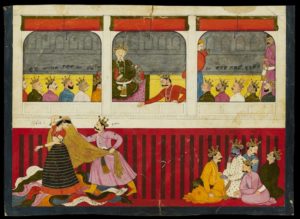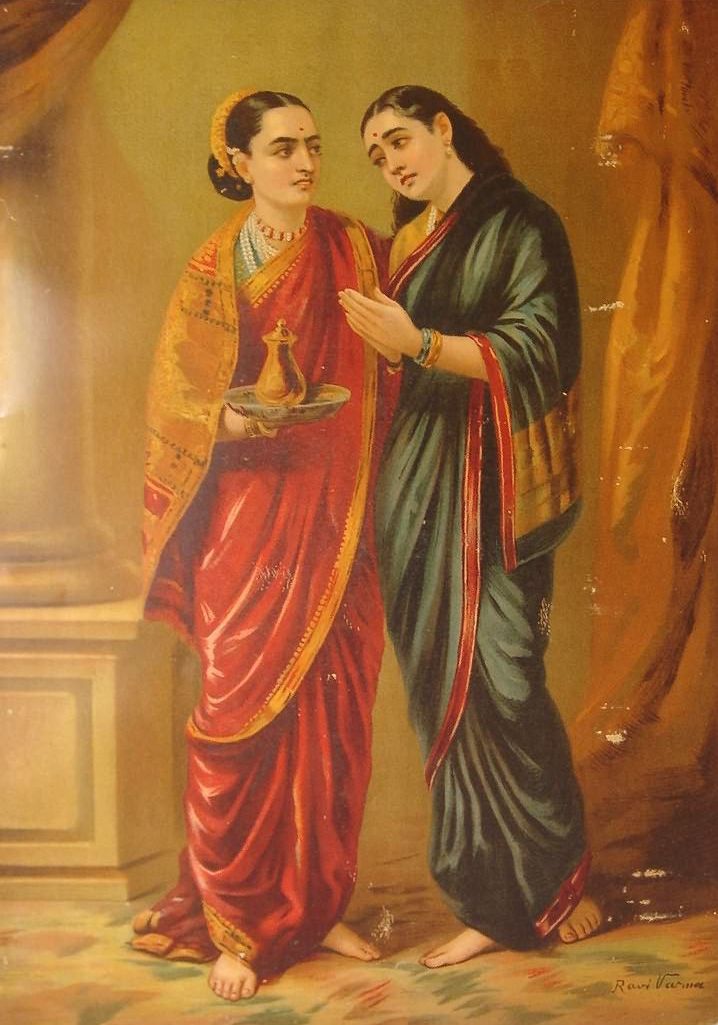The entire Mahabharata, is riddled with situations that raise many questions and are interpreted in many ways, sometimes to the dismay of some sections of the society. I have personally heard a few comments of disapproval at times. This I could put it down to lack of understanding on the other part, and the inability to explain the true purpose on my part. This is what I feel, I should rectify, as I have seen some light into this episode. The scene is from Mahabharata: Draupadi, said to be the wife of five brothers, was bargained for by scheming Duryodhan to avenge the Pandavas, and bring them to dishonor and loss of the kingdom, in a game of chess. The incidence brings forth a lot of issues, that need understanding and relevance to be acceptable by any normal average thinking human, in the context of the past and present times.
I am trying to analyze this as follows
First of all – Mahabharata belongs to the Dwapara Yuga, Unlike Ramayana, which was set in the Sata Yuga. The comparison of the two incidences occurring in two different Yugas is null and void. Rama was a Suryavanshi, believed to be Sun worshippers. Whereas Pandavas were Chandravanshi, believed to be the moon worshipers. The Yuga in the case of Mahabharata is Dwapara, suggesting that it was fading of Sata and coming of KaliYug. It was an in-between stage. The influence of which can be seen throughout Mahabharat, this incidence being one of them. SataYug gave weight age to TRUTH, above all. There is a mix of it all in Mahabharata.
Yudhishtira was also a victim of this period
Though he practiced the truth, he had to resort to other methods. In this case, he put his wife on the line to preserve the honor of the Pandavas, who were at a distinct disadvantage partly due to the dilemma of which should they support and defend, against what the odds were. This is where Krishna steps in, to bring forth the eternal truth before mankind. Now approaching the scene: where Yudhisthira is defeated in the game; and as promised he has to helplessly watch his wife being insulted by his own cousins; shows the dilemma of a King, who put his honor and values above all. Honor and Truth became a passion, to the extent that they became a vice, and eventually humbled him. Being Chandravanshis (moon worshipers) they were led and guided more by the mind (mana), not intellect (the two are different).
Faith, Belief, and Trust Being Broken
As for Draupadi, her FAITH, belief, and trust were broken; by her husband’s own kin, with the husband’s permission. The humiliation was intense. This was a rape of her unshakable faith in her many husbands right and might. All this could happen only where people are led by the Mana (mind) without the guidance of the conscience. This is the void that is filled in by Krishna. The five husbands of Draupadi, raise eyebrows in today’s context and are misinterpreted to accommodate the fancies of the lustful and the weak at heart. So is the inability of the Pandavas to defend one woman against the scheming.
 Since The Ramayana and The Mahabharata are both religious epics, they should be understood primarily in that context, rather, only in the spiritual context and should not be compared with the real-life worldly situations; unless the reader is spiritually (not religiously) ready to understand it. The reason for this being that they were authored by sages who were not living in the material world but in ashrams away from the material world. The characters are real but not all the incidents mentioned therein should be interpreted as a matter of fact. They are the author’s message, and insight into the situations perceived from his level.
Since The Ramayana and The Mahabharata are both religious epics, they should be understood primarily in that context, rather, only in the spiritual context and should not be compared with the real-life worldly situations; unless the reader is spiritually (not religiously) ready to understand it. The reason for this being that they were authored by sages who were not living in the material world but in ashrams away from the material world. The characters are real but not all the incidents mentioned therein should be interpreted as a matter of fact. They are the author’s message, and insight into the situations perceived from his level.
Yudhihstira is faced with a situation where his cousin wants to take over his kingdom from him. He is addressed as Dharmaraj, hence a bigger problem. In this context, Draupadi’s Vastraharan (rape) is, in reality, the incident of Yudhishtira’s awakening. Draupadi happens to be his soul (soul mate), who ultimately turns to Krishna for guidance. The clothes that are being pulled from Draupadi by Dushasana (the name itself suggests – bad rule or regime) are some of the inhibitions faced by Yudhistira, which are pulled away by Dushasana, and are replaced by the new knowledge or perception provided by Krishna. It is Yudhistir’s struggle between honor and subjection. It was humiliation, as he knew he had been cheated, and his duty to keep the promise, which would mean to sell his conscience to a man who did not deserve to be the ruler. This is the event where Krishna reveals the Truth to Yudhistira and suggests that he face this situation and make sure he corrects this situation, as he was, The One, meant to rule, or else it would be the End. This is the important incident which prepares Yudhishtira for a battle. This whole incident is later repeated in a different form when Arjun is faced with this situation and Krishna has to take the reigns in his hands.






